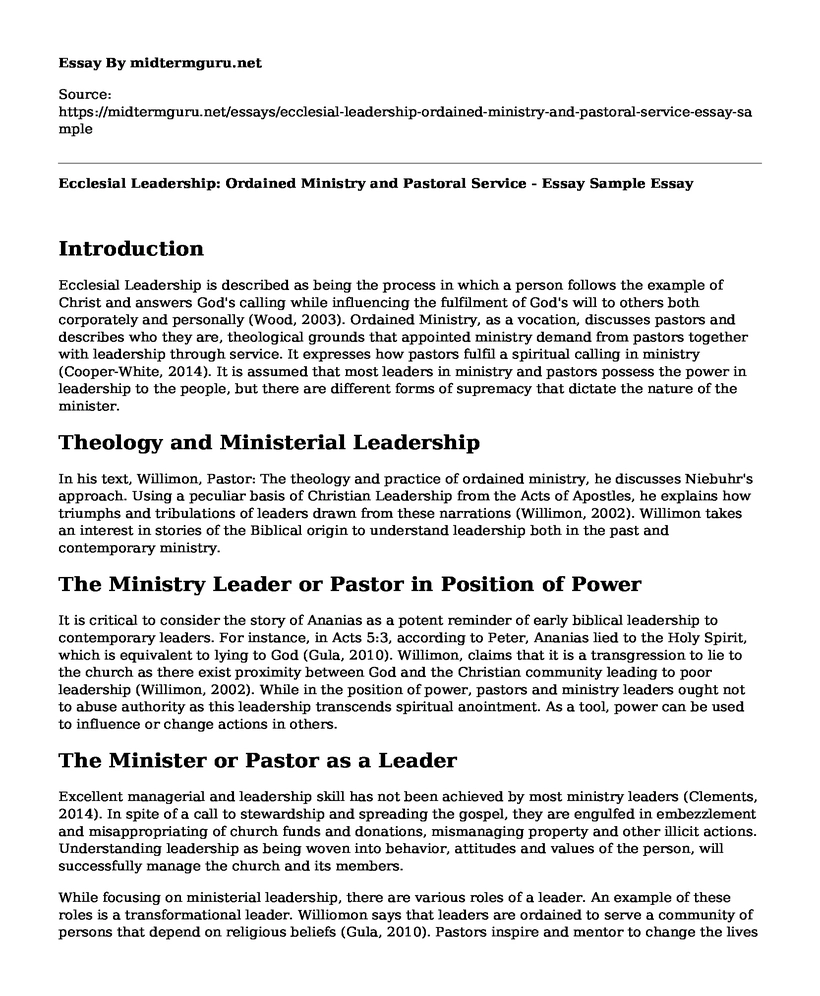Introduction
Ecclesial Leadership is described as being the process in which a person follows the example of Christ and answers God's calling while influencing the fulfilment of God's will to others both corporately and personally (Wood, 2003). Ordained Ministry, as a vocation, discusses pastors and describes who they are, theological grounds that appointed ministry demand from pastors together with leadership through service. It expresses how pastors fulfil a spiritual calling in ministry (Cooper-White, 2014). It is assumed that most leaders in ministry and pastors possess the power in leadership to the people, but there are different forms of supremacy that dictate the nature of the minister.
Theology and Ministerial Leadership
In his text, Willimon, Pastor: The theology and practice of ordained ministry, he discusses Niebuhr's approach. Using a peculiar basis of Christian Leadership from the Acts of Apostles, he explains how triumphs and tribulations of leaders drawn from these narrations (Willimon, 2002). Willimon takes an interest in stories of the Biblical origin to understand leadership both in the past and contemporary ministry.
The Ministry Leader or Pastor in Position of Power
It is critical to consider the story of Ananias as a potent reminder of early biblical leadership to contemporary leaders. For instance, in Acts 5:3, according to Peter, Ananias lied to the Holy Spirit, which is equivalent to lying to God (Gula, 2010). Willimon, claims that it is a transgression to lie to the church as there exist proximity between God and the Christian community leading to poor leadership (Willimon, 2002). While in the position of power, pastors and ministry leaders ought not to abuse authority as this leadership transcends spiritual anointment. As a tool, power can be used to influence or change actions in others.
The Minister or Pastor as a Leader
Excellent managerial and leadership skill has not been achieved by most ministry leaders (Clements, 2014). In spite of a call to stewardship and spreading the gospel, they are engulfed in embezzlement and misappropriating of church funds and donations, mismanaging property and other illicit actions. Understanding leadership as being woven into behavior, attitudes and values of the person, will successfully manage the church and its members.
While focusing on ministerial leadership, there are various roles of a leader. An example of these roles is a transformational leader. Williomon says that leaders are ordained to serve a community of persons that depend on religious beliefs (Gula, 2010). Pastors inspire and mentor to change the lives of the community members through developing a cordial relationship. Transformational leadership suggests concepts in creating a vision to transform and model others as agents of change in society (Duerksen, 2015) and devising ways that spread positive change progressively through inspirations and mentorship stimulating aimed at individual levels.
Leadership Rules
In his book, Willimon teaches useful and innovative practices in leadership that are suited for ministry leaders and pastors. First, is giving back to the society responsibly, which is encouraging and understanding members using vital skills in counselling, hence helping and not derailing them from their calling (Clements, 2014). It is the second rule to expect trouble as most pastors assume some authority; this demands that the truth be championed despite any popularity (Sanders, 2015). Willimon looks at Mark form the Gospel in this defense. As a third rule, valuing small steps eventually results in the intended long-term achievement of vision (Fox, 2010). Planning is the fourth rule, which focuses on accountability and critical activities in the church. Respecting consensus, valuing individual perspective and assessment of group dynamics with a steady persistence (Warren, 2010).
References
Clements, F. M. (2014). A manual of ministry philosophy and practice for ordination in independent churches.
Cooper-White, P. & Cooper-White, M. (2014). Exploring Practices of Ministry. Augsburg Fortress Publishers. Retrieved from Project MUSE database. https://muse.jhu.edu/book/36710 ER -
Duerksen, D. T. (2015). Ecclesial identities in a multi-faith context: Jesus truth-gatherings (yeshu satsangs) among Hindus and Sikhs in northwest India. Cambridge, United Kingdom: Lutterworth Press.
Fox, Z. (2010). Lay ecclesial ministry: Pathways toward the future. Lanham, Md: Rowman & Littlefield Publishers.
Gula, R. M. (2010). Just ministry: Professional ethics for pastoral ministers. New York: Paulist Press.
Sanders, C. J. (2015). Microaggressions in Ministry: Confronting the hidden violence of everyday church. Westminster John Knox Press
Stewart, J. W. (2015). Envisioning the Congregation, Practicing the Gospel: A Guide for Pastors and Lay Leaders. Wm. B. Eerdmans Publishing.
Warren, J. W. (2010). Moving ecclesial leaders toward self-differentiation. Austin, Texas: Austin Presbyterian Theological Seminary.
Willimon, W. H. (2002). Pastor: A reader for ordained ministry. Nashville, TN: Abingdon Press.
Wood, S. K., & Downey, M. (2003). Ordering the baptismal priesthood: Theologies of lay and ordained ministry. Collegeville, Minn: Liturgical Press.
Cite this page
Ecclesial Leadership: Ordained Ministry and Pastoral Service - Essay Sample. (2023, Feb 02). Retrieved from https://midtermguru.com/essays/ecclesial-leadership-ordained-ministry-and-pastoral-service-essay-sample
If you are the original author of this essay and no longer wish to have it published on the midtermguru.com website, please click below to request its removal:
- Managing Performance of Deloitte Paper Example
- Essay on Tensions Between Creativity and Power
- Planner Assumptions in Organizing a Community - Paper Example
- Essay Sample on Understanding Someone Else's Perspective
- Business Decision Making - Essay Sample
- Personal Statement - Master of Art in Theology and Philosophy
- Essay Sample on Double Vision Company Strategy







